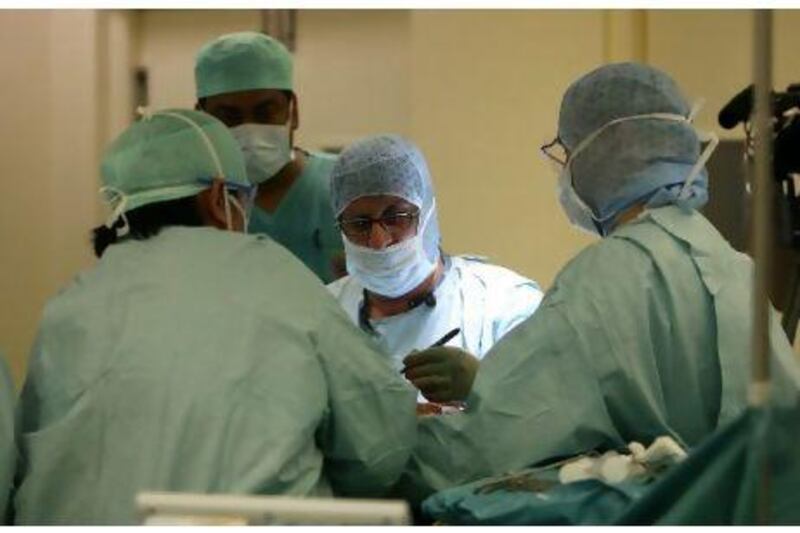SHARJAH //Shadmani Perveen has been denied the comfort of prayer because of the physical pain it caused.
But her daughter hopes next time Mrs Perveen kneels in worship she will be free of the discomfort that has plagued her.
She is one of the first patients in the Emirates to receive a flexion knee implant, after years of living with the pain.
As doctors prepared Mrs Perveen, 48, to receive surgery on her right knee yesterday, her daughter, Eisha Rehman, described her mother's almost three-year struggle.
"She couldn't pray and had many problems while walking. Sometimes she would limp," Ms Rehman said.
"She also had a thyroid problem and wanted to lose weight but she couldn't do it because of her knee problems. She's been through physiotherapy, knee injections and shock therapy, and nothing has worked."
Doctors at Al Zahra Hospital officially launched the knee replacements yesterday.
Approved by the US Food and Drug Administration (FDA), it is the first knee implant in the UAE specially tailored to suit the body type and lifestyle needs of Arabs and Asians.
Previous implant designs were based on the western anatomy, experts said.
Dr Deepak Bhatia, a senior orthopaedic consultant at the hospital, said patients in the region had special requirements that varied from those in the West.
"They have very small bones, they have very thin bones," said Dr Bhatia. "They want to pray and kneel, and they want to have a very active lifestyle.
"My Emirati patients need to kneel all the way, while my Indian patients like to do the same and sometimes sit sideways. Others like to sit in a lotus position."
Kneeling to pray requires worshippers to bend their knees at a 140-degree angle, which would prove difficult with standard knee implants, he said.
Because the implants are designed to suit eastern body types, less bone drilling is required. This is a significant benefit for the regional population, which has a high incidence of osteoporosis and lesser bone density, Dr Bhatia said.
"Women in our region tend to have smaller bones compared to their western counterparts," he said.
"There are implants that will give you good bending but they will require the removal of far too much bone.
"If you're removing so much bone in a small, thin patient, the bone might fracture or the implant will not last as long as it should."
The top and bottom parts of the implants are made of cobalt chromium, a special type of medical-grade metal.
The central part that would replace the knee cartilage is a kind of medical plastic.
While other implants use similar materials, their size and structure compromise large portions of bone.
"Every millimetre of metal that you put into the body is a millimetre of bone you need to take out of the body," said Dr Ashesh Shah, the chief executive of Maxx Medical, which designed the implants.
"We have noticed that pain is greatly reduced among patients during recovery, and although this is something we're still exploring, it could be because bone drilling is kept to a minimum."
The implants will be available in eight sizes, catering to both genders and several body types.
The surgery costs between Dh120,000 and Dh130,000 for the replacement of both knees. The procedure takes three hours and recovery about six weeks.
Dr Bhatia said while conventional knee replacements last from 10 to 12 years, the newer, high-flex models could last between 15 and 20 years.
As with other knee-replacement procedures, long-term complications can arise, including implants coming loose or replacement parts wearing out.
But these occur after a longer time than with conventional implants, and the problems can be corrected by a replacement.
The implants are available only at Al Zahra, but there are plans to offer them at Zulekha Hospital and Medicare Centre in Dubai, and the Sharjah Corniche Hospital in the coming year.
As Ms Rehman waited anxiously for her mother to come out of surgery, she said she hoped the procedure would finally put an end to her mother's pain.
"Everyone deserves an opportunity to live their lives regularly, regardless of their ethnicity," she said.





